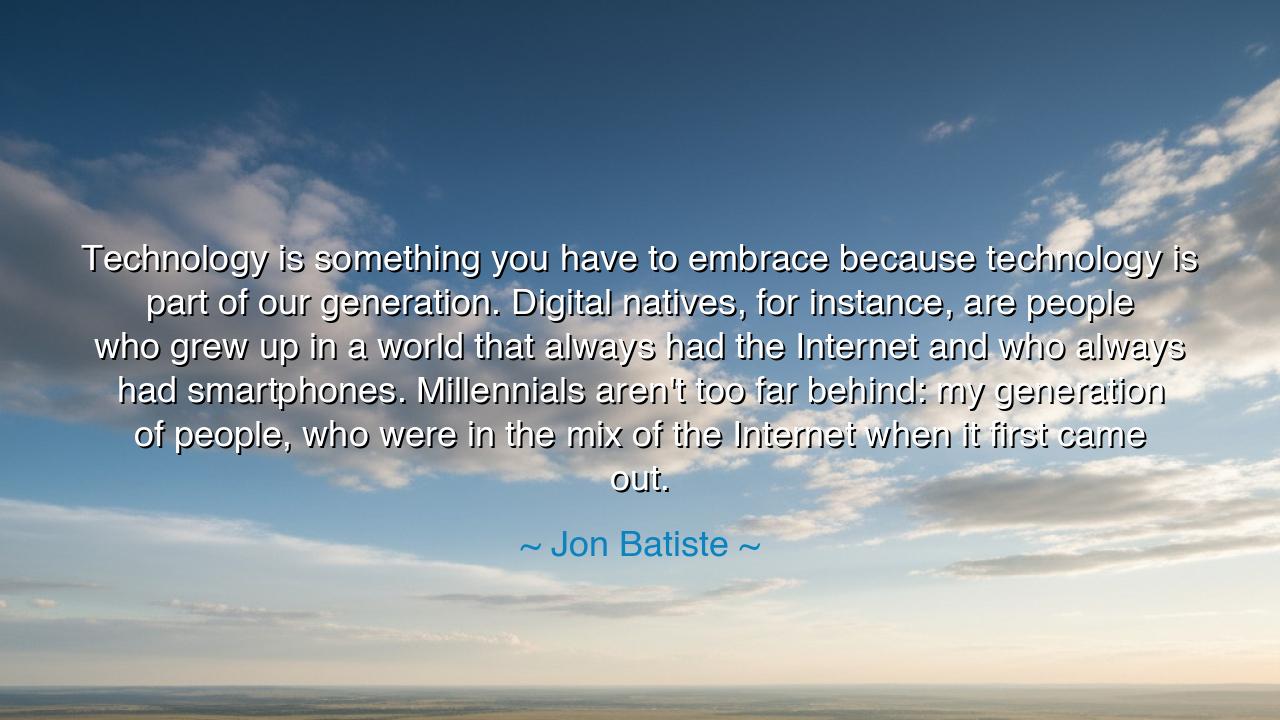
Technology is something you have to embrace because technology
Technology is something you have to embrace because technology is part of our generation. Digital natives, for instance, are people who grew up in a world that always had the Internet and who always had smartphones. Millennials aren't too far behind: my generation of people, who were in the mix of the Internet when it first came out.






The words of Jon Batiste resound like a modern oracle: “Technology is something you have to embrace because technology is part of our generation. Digital natives, for instance, are people who grew up in a world that always had the Internet and who always had smartphones. Millennials aren't too far behind: my generation of people, who were in the mix of the Internet when it first came out.” At first, these words may seem simple, a reflection on the march of progress. Yet, beneath them lies a truth of great magnitude, a call to arms for those who live in this age of transformation.
For what is technology, if not the forge-fire of our time? It shapes the tools with which we build our lives, the bridges by which we connect to one another, the scrolls upon which the knowledge of all ages is written. In the ancient days, fire itself was a kind of technology, as was the wheel, the plow, the compass. Each invention changed the course of human destiny. So too now, the Internet and the smartphone are not mere conveniences; they are the very rivers through which our civilization flows. To reject them is to deny the current of history itself.
Batiste speaks of digital natives, those born into the web of this new world, who know no dawn without the glow of screens, no path without the map of algorithms guiding their steps. They are like children of Athens, raised among marble and philosophy, except their agora is not the marketplace of stone but the endless marketplace of the digital realm. For them, the Internet is as natural as breath, and the smartphone as inseparable as a hand. Yet even those who came before, the millennials, who stood at the threshold when the Internet was first unveiled, are kin to this transformation, witnesses of a dawn no less profound than the rising of the sun upon the world.
History offers us an echo of this truth. When Johannes Gutenberg unveiled the printing press, it was met with awe, suspicion, and resistance. Some feared the written word spread too easily, diluting tradition. Yet those who embraced it unleashed a torrent of knowledge that ended centuries of darkness and birthed the Renaissance. Books traveled like winged messengers, carrying wisdom from one land to another. It was not patience alone, but the bold embrace of new tools, that opened the doors of enlightenment. So too in our time, those who cling to fear and turn away from technology risk being left behind, while those who welcome it shape the world to come.
Yet, let us not mistake this embrace for blind surrender. The ancients would say: a sword is neither good nor evil; it is the hand that wields it that determines its fate. Technology, like the sword, may liberate or enslave. It can build bridges between souls across oceans, or walls that trap us in illusions of solitude. The choice rests with us. The Internet can teach the wisdom of the stars or drown us in the shallow pools of distraction. The smartphone can connect us to loved ones or bind us in chains of endless scrolling. Thus, wisdom demands not only embrace, but mastery.
Batiste’s words are a reminder that we are all heirs of this age, whether born into it or ushered into it midway. To reject the gifts of our time is to silence our voice in the great conversation of history. To embrace them, however, is to stand upon the shoulders of progress, to see farther, to speak louder, to act with greater reach. Let us not be timid travelers, afraid of the path beneath our feet, but bold voyagers who take up the compass of technology and navigate the seas of possibility.
So, what lesson must you carry, O listener of this teaching? Embrace technology, but wield it as a master, not as a servant. Learn the tools of your age—understand the web, command the code, discern the false from the true. Guard your mind from the snares of distraction, but open your spirit to the boundless opportunities of creation. Write, share, learn, build, connect—for these are the arts of the modern age, as sacred as the lyre of Orpheus or the scrolls of Alexandria once were.
In the end, Batiste’s words are not just about machines, but about destiny. Our generation is marked by this great transformation, and history will remember whether we cowered before it or rose to meet it. Therefore, embrace the fire of technology, not as slaves, but as architects of the future. And may you wield it wisely, with courage and discernment, so that generations to come will bless your name.






AAdministratorAdministrator
Welcome, honored guests. Please leave a comment, we will respond soon